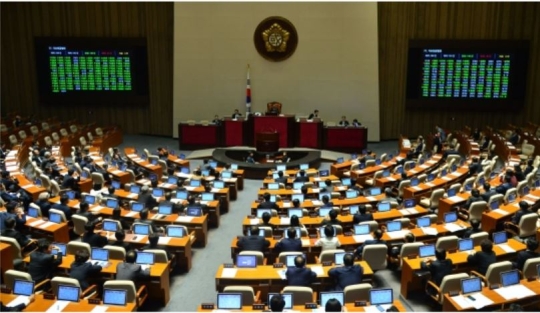A shift from 'giving benefits' to 'guaranteeing rights'
The Act defines the term 'gender equality'
It provides a legal basis for the creation of women-friendly cities

On May 2, in 19 years since its enactment in 1995, the Framework Act on Women's Development, the applicable law for the establishment of women's policy and the compilation of the budget for women's issues, has been revised completely. The change sinals a paradigm shift in women's policy: The goal is to achieve gender equality by guarateeing women's rights, going well beyond enhancing women's development.
Though it has been revised 16 times to promote women's rights and to help women enter the workforce, the Act failed to address changes in the status of women and in society.
Against this backdrop, two separate amendments were proposed. While the Saenuri Party presented the Framework Act on Gender Equality in December 2013, the New Politics Alliance for Democracy (NPAD) handed in the Framework Act on Sexual Equality in January this year. On April 28, the Gender Equality and Family Committee had a plenary session over the proposed amendments. Given the title ‘Framework Act on Gender Equality,’ the amended version was passed during the National Assembly’s plenary session.
Taking effect in July 2015, the Framework Act on Gender Equality protects gender equality-related rights and strengthens the government’s responsibility. First, the definition of ‘sexual harassment’ is expanded: It is changed from the previous version of ‘putting the other party at a disadvantage in employment’ to ‘putting the other party at a disadvantage,’ extending the definition. Also, the act of ’sexual harassment’ now includes ‘showing an intention to offer rewards’ and the ‘coercion of a sexual nature.‘ Second, the Minister of Gender Equality and Family carries out a thorough review of the present status of gender equality and formulates the Basic Plan for Gender Equality Policy every five years accordingly. Third, the central and local governments have to endorse gender mainstreaming while performing duties. Meanwhile, the Act provides regulations regarding Gender Impact Assessment, Gender Sensitive Budgeting, Gender Sensitive Statistics, Gender Sensitive Education, and Gender Equality Index. Also, the Minister of Gender Equality and Family has the authority to advise relevant agencies or local governments to take active measures when gender discrimination leads to under-representation of any gender.
Under the Act, a quota for women in executive and senior positions will be implemented to enhance women’s representation. The Act seeks to achieve gender equality by protecting both motherhood and fatherhood, while introducing a ‘Gender Equality Week,’ instead of celebrating Women’s Week. At the same time, it provides a legal base on which the government may create women-friendly cities and carry out relevant monitoring and reexamination.
As opposed to the Framework Act on Sexual Equality, the Framework Act on Gender Equality regulates that a Gender Equality Committee, the successor of Women’s Policy Coordination Meeting, reports to the Prime Minister and deliberates or adjusts important matters related to gender equality policy. The Committee seeks to draw participation from citizens as well. Various subcommittees will implement relevant policies and measures in an effective manner.
Lawmaker Shin Kyungrim from the governing party said “We have marked a paradigm shift in 19 years. Instead of granting benefits to women, we have to empower them and guarantee their rights. The passage of the amended act has laid a foundation for us to deal with ever-changing gender agendas. Our expectations are high that the government will execute gender policies effectively through gender streaming and adopting approaches such as Gender Sensitive Budgeting and Gender Sensitive Statistics.”
Chairman Kim Sanghee of the Gender Equality and Family Committee commented “The decision to change law has been long overdue and desperately needed. The focus of women’s policy has already changed from ‘development’ to ‘gender mainstreaming’ or ‘gender equality.’ One regrettable thing is that we gave it a title ‘gender equality,’ instead of ‘sexual equality.’ We already have ‘sexual equality’ ordinances throughout local governments. The title of the act indicates that we are bucking the trend.”

